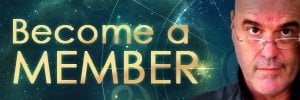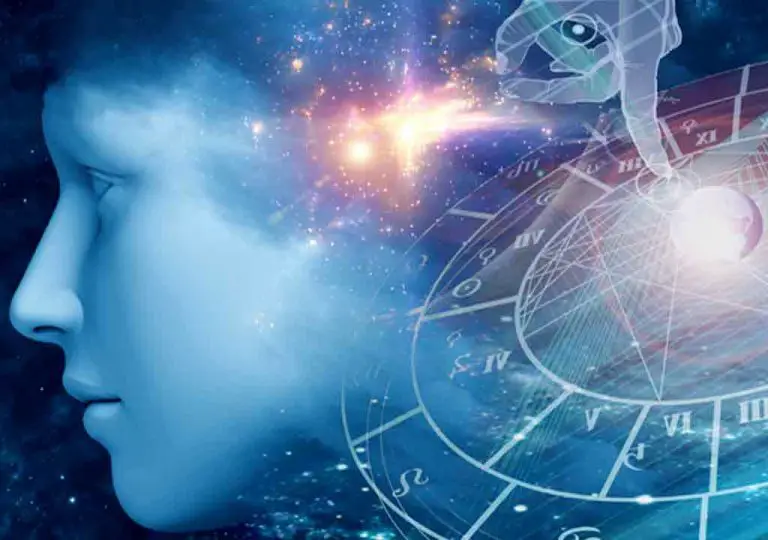
The connection of Science & Astrology
In this article find out about the scientific basis for astrology:
- Astrology is about karma, the law of cause and effect
- Most Sun sign astrology is broad-based and doesn’t take into account all the planets
- There are many branches of astrology in both the tropical & sidereal schools
- Astrological schools of thought are at variance on both technical and interpretive aspect
- Traditional and clinical interpretations don’t agree
- Best approach is a synthesis of all systems based on reliable and replicable facts and research
- Scientists like Galileo and Newton were staunch believers in astrology
- Our lives are based on time which is rooted in astronomical/astrological cycles
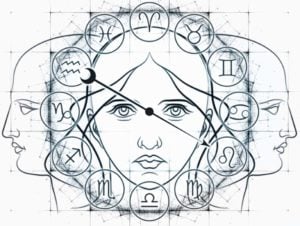
The problem with Astrology
Although an astrologer for 35 years, you’ll still find a little of the sceptic in me. I’ve always been interested in researching a scientific basis for astrology. That’s why I often refer to myself as an irreverent astrologer. My cynicism isn’t directed to astrology per se. But rather the way in which it has been foisted on a largely unsuspecting public with little or no scientific validation. I suspect that sceptics wouldn’t disagree with me on that.
You see, the problem with modern astrology is: it’s been served up homogenized by year market soothsayers in newspapers and online platforms by erroneously correlating human nature and destiny to a singular solar point in the heavens – the Sun. This is just wrong and doesn’t do justice to the as yet, fully understood subject of astrology.
East & West Astrology
The discipline is a structured study, and one with thousands of years of rules and premises for its claims. It is splintered, both east and west, up and down, inside and out. I can say that with a high degree of confidence having studied many branches of the subject. Within these numerous camps utilising differing protocols, the inherent issues distill down to such essential necessities as mathematical calculations. It’s a slippery slope.
For example, sidereal or Vedic astrology. The positioning of celestial bodies is dependent upon the value of the precessional equinox. That in itself is a problem. Why? Because there are probably a dozen or more systems of which this precessional value is still as yet not agreed-upon. These variations also fly in the face of any scientific consistency.
Can you imagine engineers in Germany and the US disagreeing on how many millimetres in a centimetre? And interpretations also display anomalies. This is not at all how science works. For this reason, even as a professional astrologer, I have to say, that we have no one to blame for the disbelief and skepticism we encounter from others except ourselves!
Statistic Astrology
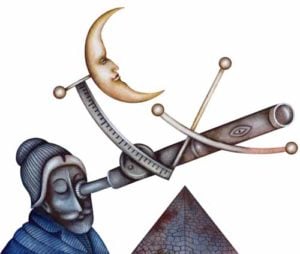 Of course, there’s the financial component of being a fortune teller because astrologers, like anyone else, have to eat and pay their rent. Unfortunately, my years of experience led me to believe that there are only realistically one in a thousand astrologers who are dedicated to studying their craft in an unbiased manner.
Of course, there’s the financial component of being a fortune teller because astrologers, like anyone else, have to eat and pay their rent. Unfortunately, my years of experience led me to believe that there are only realistically one in a thousand astrologers who are dedicated to studying their craft in an unbiased manner.
Let me give you an example. Most astrologers would agree that the fire signs of Aries and Leo are perfectly matched. Go ahead, look at any book on astrology and tell me they don’t advocate that a Ram and a Lion are perfectly suited.
Notwithstanding the fact that few of them have done any research whatsoever on their own clients or the populace to verify this. These creatures by their very nature, in real life, don’t exactly get on, do they? The lamb would make a tasty morsel for Leo.
The fact of the matter is that researchers like Gunter Sachs have actually done statistical research showing, in this case, that Leo and Aries have one of the highest divorce statistics. The numbers don’t lie. But it’s like religion, once hooked on a belief system, is very difficult to extricate yourself from. Few would want to admit that all those years of study and investment of time and energy have been predicated on wrong principles.
Now, this doesn’t mean that after 35 years of practice, with 10,000 clients under my belt, and a research database of over 45,000 horoscopes I’m going to throw in the towel as an astrologer. I’ve had the opportunity to either verify or denounce some of the traditional findings of astrology. As you can see above with the tragic tale of the lamb for lunch.
A more accurate approach to astrology is the synthesis of a variety of celestial factors at the time of birth (or for that matter any event). To see the fractal connection between events astronomically and terrestrial life here on earth. Is there a connection?
Branch of Science that was just newly recognized
Well, scientists say no but in much, the same way as acupuncture was ridiculed 30 or 40 years ago and is now listed on most health insurer’s reimbursement lists. Astrology is in its ascendancy as a credible science, as it once was. And there are many scientific disciplines that previously suffered being ostracized in the same way as astrology is now.
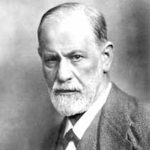
Take psychology, or even the social sciences. These sciences don’t necessarily follow the same regulations that physics, chemistry or mathematics do. There is indeed a way of categorizing certain states or conditions of human beings and drawing deductions. But even within the realm of psychology if we use that as a case in point, Jung and Freud didn’t exactly agree perfectly on the human condition either. Gender dysmorphia, or what it used to be known as, is now gender fluidity. That’s just one example.
Nature & astrology
It’s not common knowledge that some of our most illustrious high forefathers of science were believers. Like Galileo, upon whom we built our contemporary scientific astronomical model, many were staunch believers in astrology but practised it. It raises an interesting question, doesn’t it?
Why would a purely scientific and rational mind have reason to believe that the Sun, Moon, planets and stars have some bearing on human behaviour and destiny. Why would someone of this calibre attribute more than just pure mathematical and algorithmic meaning to celestial mechanics? Other scientists like Galileo, Isaac Newton and yes, even Einstein had some sense of the mystical within the purely clinical framework of their chosen scientific fields.
Seasonal Biology of Astrology
In conducting my own research and studies in this field I’ve been fascinated by the most recent developments in what is now being coined seasonal biology by scientific researchers. Transmission of genetic information via laser between species now opens a new door for supporting the notion that spectral emissions. From stars may indeed contain the chemical information of those stars and are in some way a genetic switching device.
Here are some examples of how, unconsciously at least, we in some way or other live our lives on astronomical/astrological principles-
- The simplest example of how astrology dominates our lives is by looking at how many people wear a watch. We may not believe that the planets affect us but time itself is based on a solar cycle.
- The circadian rhythm is very well known as impacting biological lifecycles. Waking and sleeping follow the cycle of the Sun and Moon.
- The most recent research shows just how important the circadian clock is in terms of human behaviour, psychology and biology.
- The female menstrual cycle is coincidentally or is it, generally, a 28-day cycle, as is the lunar cycle.
- Food. The Sun and sunlight effects of plants photosynthetically by producing simple sugars through this process. Human skin also reacts to sunlight by producing vitamin D.
Human Behaviour & Planetary Influence
We still don’t quite understand how astrology works and the argument that it is somehow related purely to a gravitational influence has easily been debunked by science. But are there any other correlations between human behavioural biology and planetary influences? Yes, there appears to be mounting evidence to suggest that seasonal patterns do indeed impact on human life. And in particular, temperature variations at different latitudes seem to influence the occurrence and frequency of fertilisation. Particularly in those latitudes which have hotter temperatures. The production of sperm in these hot climates is statistically verifiable. This needs further study but shows that there are seasonal correlations at play.
Ovulation
This is also controlled by the seasons especially where the availability of food impact upon different populations in specific regions varies. It may not be a direct correlation but as mentioned earlier. For example, if the food which is produced using photosynthetic process of sunlight is not in plentiful supply it does indeed have an impact on ovulation. Hot temperatures also seem to inhibit the development of embryos.
Some of the data indicate that the photoperiod of humans is regulated at least in part two seasonal variations in the middle to higher latitudes. There is a peak of expected conception rates and these are connected to the vernal equinox. As you’d expect, some neuro-endocrinologists have a different view and don’t accept this. Once again, much more research is necessary. What’s even of greater necessity is an open mind.
Using a little common sense, however, we can piece together this celestial puzzle and put two and two together. With the cycle of Jupiter being just on 12 years, and the sunspot cycle also approximating the same cyclic duration, there’s evidence to indicate that crop yield, droughts and other terrestrial phenomena are very much linked to these solar cycles. A thorough analysis of hysterical trends, mass mentality which stock market crashes are aligned with. War and other sociological shifts are easily correlated to these celestial cycles.

About the author:
DADHICHI TOTH
Dadhichi Toth as a consulting astrologer and founder and director of https://astrology.com.au. He has been an astrologer for 35 years having consulted with over 10,000 clients. He wrote the astrology series of books for Harlequin Mills and Boon for 9 years and now enjoys a reasonably quiet life with his family in the province of the Philippines.
Email: [email protected]













